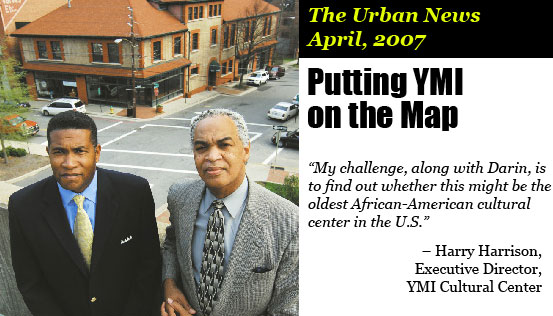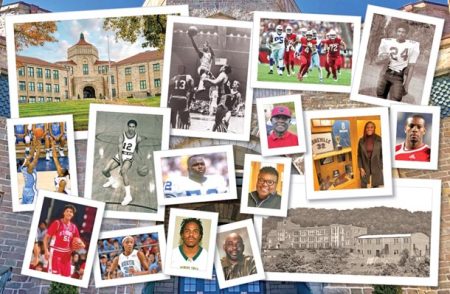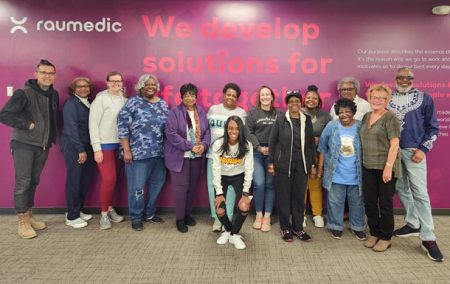Putting YMI on the Map: The YMI Cultural Center History Project
What
difference can a book make? A lot of difference-according to Harry
Harrison, Executive Director of the YMI Cultural Center.
Harrison
arrived at the YMI in April 2006 and held a staff retreat in June. The
resulting vision statement: “Within the next five years, the YMI
Cultural Center will re-tool itself and emerge as a leading historic
destination and attraction in Asheville, NC.”
“Collaborating with Biltmore Estate… the YMI will publish its own
book, organize relevant exhibits, set standards for excellence in
education, present engaging performances, and produce memorable media
expressions to satisfy our eager supporters and the community,” says
Harrison.
.jpg) |
| Darin Waters, PhD candidate and researcher and (right), Harry Harrison, YMI Executive Director, stand in the hall of the historic YMI Cultural Center. Photo by Renato Rotolo |
The
needs are quite visible. Currently there are no significant
publications about the YMI. The few brochures, magazine articles, and
honorable mentions available are incomplete and sometimes contain
inaccurate information. Furthermore, very little is recorded about the
African American craftsmen who actually constructed the YMI building,
which is why a well-researched book is at the center of Harrison’s
development plan.
Harrison began
looking for a history scholar and found Darin J. Waters, a PhD
candidate at UNC-Chapel Hill. His dissertation title is “African
Americans in Asheville 1880-1930: Community Development in the Era of
Benevolent Paternalism and Progressive Reform.” His research examines
social traditions, demographics, labor conditions and practices, and
race relations during the turn of the century in Asheville with an
emphasis on the YMI’s central role in developing African-American
cultural heritage.
How is YMI Unique?
“My challenge
along with Darin is to find out whether this might be the oldest
African-American cultural center in the U.S., “ Harrison declared.
“Penn Center in S.C. is older, but it started as a training center for
freed slaves, founded in 1862. It is my belief that the YMI is one of
the oldest African-American cultural centers in the country, and I want
to substantiate that. The YMI was never affiliated with a college,
university, or faith based organization; it is free-standing… and has
always been a center for cultural and economic improvement,” Harrison
stated.
Furthermore,
Harrison notes that its development was unusual during a tumultuous
time.
“Comparatively speaking, there were other philanthropists who
supported Historical Black Colleges and Universities (HBCU’s) in the
south, but support for a free-standing African-American community
center was rare 30 years after the Civil War.”
“What is so
unique about this center is that it had rental or lease space on the
lower level, for other businesses,” Harrison continued. “There were
medical offices, libraries, a dentist’s office, a drugstore, all within
this cultural center facility-truly a catalyst for economic growth in
the African American community. There was also a night school for
adults, a day school and kindergarten, a Sunday school, library,
gymnasium, swimming pool, and meeting and reading rooms. It served the
entire African-American community of Asheville.”
Mimi Cecil, a
former YMI Board member and wife of William Cecil, who owns the
Biltmore Estate, put Harrison in touch with contacts at the Estate.
Chuck Pickering, Executive Vice President of the Biltmore Company was
pleased to support the collaboration and gave Harrison permission to
work with his staff and to access the Biltmore Estate archives. “The
research we are conducting with YMI is really exciting for Biltmore. We
have a rich history together and working with the YMI’s team has
allowed us to focus our efforts on learning more,” said Pickering. “We
look forward to sharing this incredible story with the public upon
completion.” UNC -Asheville, Pack Library, and Appalachian State have
pieces of the puzzle as well.
Reconstructing the Stories
Harrison’s goal
is “to reclaim, re-collect, and re-tell the dynamic century-old history
of the YMI Cultural Center and create energized programming to secure
its future.” And he’s ready to ask the right questions. “I’m looking
for architectural renderings and drawings,” Harrison said. “I would
also like to know where the residents who had connections with the YMI
stayed. Also, who owned some of the businesses that operated out of the
YMI building?”
Dynamic and well thought out questions are only the beginning.
“We want to do
kiosks and visuals to let people know who the general secretaries of
the YMI were – like a walking history lesson. We’ll design educational
curricula for the public schools; perhaps a virtual tour. A shared
tourist program between Biltmore and YMI will be established. Students
can learn North Carolina history that isn’t in the history books. We
want to show that African Americans had a presence here in Western N.C.”
Archival
research may also lead to re-enacting Sunday afternoons at the YMI,
with contemporary choirs singing popular songs from the past.
“The vision has
four components: history, education, building an endowment, and capital
improvements. Within five years, this will be a destination point for
tourists,” Harrison declared. “The YMI needs more recognition. It’s
over 100 years old. The whole area will benefit.” The YMI forecasts a
25-40 percent increase in visitors once initiatives have been set into
place.
Funding the Vision
Writing a book
of the kind Harrison envisions requires research, time, and funds. As a
graduate student with a family, Waters would have had to teach at the
same time as doing the research for his dissertation and the book,
requiring a minimum of three years. That’s when Cynthia and Joseph
Kimmel stepped into the picture. Cynthia Kimmel is involved in the YMI,
is a friend of Harrison’s, and supports his vision. Kimmel has a keen
interest in African American history and is fascinated by Asheville’s
unique post-Civil War experience. She met Waters last November and
immediately felt confident that he would do an outstanding job of
research and writing. “Darin Waters is impeccably principled, bright,
articulate, honorable, and trustworthy-and he and his family are from
Asheville. We want him to succeed!” says Kimmel. By freeing him from
teaching, the project will be done in a year and a half.
Kimmel and her
husband have been supporters of the YMI, the Center for Diversity
Education, the Fine Arts League of Asheville, Buncombe County Medical
Society, the Asheville Art Museum, Black Mountain College, and Quality
Forward. They sponsor a portion of Project Access under Buncombe County
Medical Society, making medical services available to low income
people. Their biggest area of giving is education, contributing funding
to UNC-A and Western North Carolina University. Joseph Kimmel works in
the construction management field and is starting a new construction
management, engineering, and technology school at WNCU. They fund
scholarships as well.
“We want to
bring greater awareness to the YMI and inform the community more deeply
about its history,” Kimmel continued. “Even some African-American
friends of mine haven’t heard of it! By funding Darin’s research, we
are priming the pump in hopes that others will also step forward to
know and support this project. We hope that anyone in the community who
may have historical documents or archives relating to the early history
of the YMI in their family basements will contact Darin.”
Support the YMI
If your agency
or charitable foundation would like to support this important
restorative history project, please contact Harry Harrison, Executive
Director of the YMI Cultural Center at 828-257-4542.
If you would
like to become a member of YMI, please visit www.ymicc.org. A year long
$35 membership includes substantial discounts for all programs,
discounts on space rentals, and information on programs via mailings
and email. Lifetime membership is $1500.









